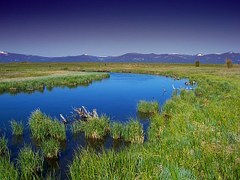Georgia, Florida and Alabama just can't agree on how to use the rivers that flow through all three states. Atlanta continues to grow at breakneck speed and wants the water for its growing population. Alabama and Florida farmers disagree, funny thing. And the fishermen and environmentally-concerned along Alabama's coast object to the decreasing flows' effects on their wetlands and, subsequently, on the productivity of their fisheries. Unfortunately, the water flows one way...and the three states can't agree. So, the US Supreme Court now has to decide on who gets what. Why can't people just get along?
Environmental issues frequently don't regard political and social boundaries. On top of that, they frequently involve interactions between different dynamic ecosystems that constantly are responding to a variety of disturbances. When we mix dynamic interacting ecological systems with people who competing for water and land, who has the knowledge and ability to manage the landscape to meet everyone's needs. No one. There lies the problem and the promise.
Over time we have come to realize that developing policies promoting sustainable land and water use, conservation of biodiversity, and sustainable communities, for example, involve far more than any one entity, governmental or nongovernmental, can handle. Now the state-of-the art thinking on environmental issues involves getting all those affected in some way by an environmental problem to work together to solve the problem.
Why is this important? Just a few examples: Politicians and decision makers sitting in DC or the state capital often are too far away from the scene to really know what's going on. They need the people who are on the ground to give them the low-down on what's really happening. Yet, the politicians may be more concerned with getting re-elected than with solving the issues affecting, e.g., politically marginal fishermen and farmers. The latter often know a lot about the environment they live in, but don't know how to communicate this to decision makers and don't have the mechanism to do so. Universities can analyze complex social and ecological issues, but lack the intimate knowledge local people have and the authority of elected officials to act. So, the thinking goes, get all the stakeholders around the table and let them combine their strengths so that together they might be able to address a problem bigger than any one of them can handle on their own.
Getting people to work together assumes that over time they have built up the trust and commitment, the "social capital," that would enable them to do so. In reality different communities distrust one another, and they all may distrust government bureaucrats and "pointy-headed" academics. As a result, it's not surprising that, while many of these efforts work well, others fail spectacularly. Speaking from personal experience in a more academic environmental context, I can say that it requires lots of patience, perseverance, humility, and hope to continue to slog through the swamp of vested interests, struggles over turf, and long-standing grudges that's the terrain of collaborative environmental decision making.
Unfortunately trust, patience, humility and hope often are in short supply when dealing with groups of people. Getting to sustainability thus requires finding ways to develop these attitudes in ourselves and in those we work with. It implies reconciling and healing both people and land to one another. A task this daunting and personally challenging begs us to ask for help from the One whose greatest desire is to bring about reconciliation and unity, the only One who ultimately has the capacity to do so.
Years ago Walt Kelly's cartoon character Pogo declared prophetically, "We have met the enemy and he is us." In the environmental arena that certainly is true. We also can be our best friend and ally. We just need a little help.
[For more on collaborative approaches to achieving sustainability see Mazmanian and Kraft. Toward Sustainable Communities: Transition and Transformations in Environmental Policy, 2nd ed. MIT Press 2009.
More about this author
Certificate in Contemplation and Creation Care
Center for Religion and Environment at Sewanee: The University of the South

